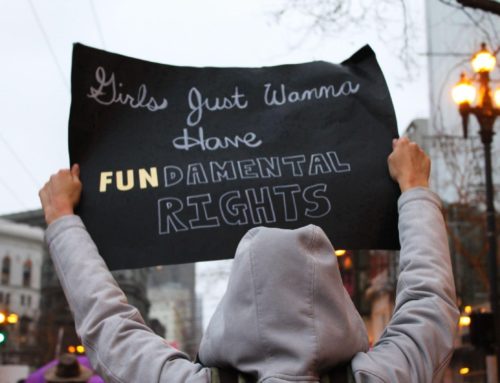By Mandy J. Benson
Some have expressed fear that the #MeToo, #WeSaidEnough and #TimesUp campaigns are taking things too far. There seems to be an assumption by some that the women who have complained of sexual harassment are demanding that employers push the alleged harasser to resign or be fired immediately. The fear is that men lose their jobs without due process, and that companies are complying with these women’s specific demands. Some are complaining that men aren’t getting an opportunity to defend themselves before they are terminated, thus ruining their careers and families over a possibly false allegation.
We’ve all been taught the following myth about sexual harassment. We’ve been told it is typically a He Said, She Said situation, where there is no proof because he really just likes her and didn’t do anything wrong. Maybe he was persistently asking her out. Maybe he was just trying to win her heart. Maybe she is cold and unfeeling. Maybe she needs this nice guy to open her up. Maybe. But that’s too many maybes.
First, although this is a common scenario that is on the less severe end of the spectrum of harassment, it’s unlikely to get you fired. Typically a supervisor or HR representative is going to talk to him (if it’s a him) to tell him the behavior is unwanted and to stop asking her out. He will be referred to the employer’s policy on sexual harassment, and he will be told that he’s prohibited from retaliating against her. Retaliation could result in termination. Unless the alleged harasser has a history of similar behavior or discloses other issues or problems, he likely will just get a warning letter to sign, which will go into his employment file. Unless he retaliates or continues to harass her, he will most likely not be fired.
Second, I want to explain why this is harassment. Many people may think that this is typical dating behavior. You like someone. You ask them out. If they say no, you don’t give up. You get to know them. You keep asking them out. Romantic comedies and media make it seem like many romances have started this way, and perhaps some have. But many more sexual harassment and stalking stories start out the same way.
The problem isn’t with asking someone out at work, unless that is a policy violation in your organization. Assuming it is not a violation, the problem isn’t with asking the person out, the problem is asking them persistently. By continuing to ask her out is to assume that you can change her mind. But the very nature of trying to change her mind is to try to exert power over her. You are literally trying to change her decision and behavior, which is to manipulate her to do what you want her to do.
Unwanted attention that is persistent and pervasive will impact the target in many ways over time. Eventually, the biggest challenge she faces at work isn’t her workload, it’s how to avoid this unwanted behavior. She may have concerns that the behavior will escalate, that he may be stalking her, or worse, that he might be violent. Although there is an entire spectrum of harassment, and this guy might just have a big crush, as women living in a rape culture, we have to be prepared for the worst. This unwanted attention may start to control her behavior as she tries to navigate how to avoid interacting with this person, by changing her route to work, what she wears, what meetings she attends, what projects she wants to work on, and so much more. Here, this seemingly benign attempt to date has turned into sexual harassment, which is still on the less severe side of the spectrum, but is still interfering with her ability to come to work and do a good job. This is why we say sexual harassment has more to do with power than sex.
When asked my advice on dating in the workplace, I tell folks to first consider how serious they are about the person. I recommend they wait to see if their crush disappears over time, or if it grows. If they are very serious and have a positive friendship with the person, then I’d suggest asking the person out once. If they say “no,”, “I’m busy”, “maybe” or anything else that isn’t a clear yes, then you should thank them, say “see you later” to show there are no hard feelings and you are happy to continue working with them, and don’t bring it up again. If they say yes, then one date has been accepted. This is just one date. Enjoy it, but be very respectful and make no assumption that there will be additional dates or more of a relationship. But don’t push or ask for anything. Let things grow naturally.
Employers are under heightened scrutiny by the press and the public, which gives them no reason to terminate someone unless they have explicit cause. They know that any wrong move can land them in a lawsuit, which is exactly what they are trying to avoid. When an employer makes the decision to terminate an employee, what an employer cannot share with the media, the public, or even their employees is what that explicit cause is, but it is most likely well-documented evidence or witnesses of egregious behavior. So while you may hear some of the complaints against an alleged harasser, you are likely not hearing all of the complaints, or all of the details. As we’ve been hearing in the public discussions on sexual harassment, there is a spectrum of behavior and that not all harassment should be treated the same. I agree, and I can attest, that all harassment is not treated the same by employers. If an employee is fired on the spot, you should assume that the behavior was severe, pervasive, or retaliatory, and the employer had an obligation to terminate the employee to keep their employees safe.
Mandy J. Benson of MJ Benson Consulting provides Sexual Harassment Prevention Trainings and Strategies to create safe, healthy environments where everyone can thrive. Learn more about Mandy and her services at MJBensonConsulting.com.






